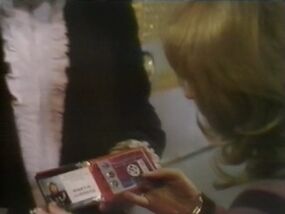Martin Jurgens
Martin Jurgens was an Adjudicator for the Bureau of Interplanetary Affairs during the 25th century. He was a light-skinned man with curly hair and a beard, and wore a rigid black and silver robe with a tall stiff collar.
In 2472, the Master stole Jurgens's credentials and travelled to Uxarieus, posing as an Adjudicator in a scheme to gain control of the Doomsday Weapon. Captain Dent, growing suspicious, requested a copy of the Adjudicator's credentials from Earth Control; when they sent back a photograph of Jurgens, Dent realised he was dealing with an impostor. Later, Jo Grant found Jurgens's original credentials in the Master's TARDIS, which was camouflaged as an Adjudicator's spaceship; she showed the credentials to the Third Doctor, who kept them. (TV: Colony in Space)
According to another account, the Adjudicator's name was Martin Jurgen. The credentials found by Jo showed "a clean-shaven man with a round chubby face, blue eyes, and fair hair". The Doctor looked sadly at the photo and said, "Poor Martin Jurgen, whoever he was, is probably floating for all eternity in Space, or atomised." (PROSE: Doctor Who and the Doomsday Weapon)
Behind the scenes
Jurgens never appears in person, but his photograph appears in two scenes in the fifth episode. In reality, this was a photograph of Graeme Harper, the serial's assistant floor manager, posing in the same black Adjudicator robe that the Master wears while incognito.
Five years later, a close-up on the same photograph was used to represent one of the Doctor's earlier incarnations in The Brain of Morbius. It is unclear whether the intention at the time was to retroactively reveal Jurgens as a disguised Doctor, rather than simply a matter of convenience, although the discovery of this fact sparked speculation to that effect from such sources as Paul Hanley.[1]
References
- ↑ Research by Paul Hanley


